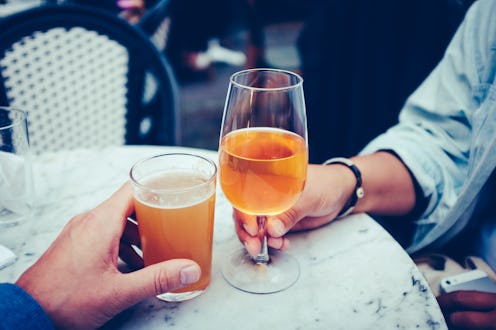Life
Turns Out Drinking A Beer Makes You Better At Speaking Another Language
Drinking isn’t really known for being beneficial to people’s communication skills. (A quick look through your most recent drunk text conversation will tell you that.) However, recent research suggests having a buzz could actually help you speak better...provided you aren’t trying to speak in your native tongue. According to a new study, drinking a beer can improve how well we speak another language. Before you get ahead of yourself, that doesn’t mean you can down a few pints of Guinness and suddenly speak Irish. This is science; not straight up witchcraft.
The study was conducted by researchers from three different universities in Europe who wanted to learn about the effects of light alcohol consumption on foreign language skills. The study’s participants consisted of 50 native German speakers who had recently started learning Dutch. Each participant was provided a drink and then had a conversation with a stranger in Dutch. Some participants received about a pint of beer with a 5 percent alcohol content. (Researchers also accounted for individual’s body weight in their alcoholic drink percentages.) The other participants drank a nonalcoholic beverage. Then, two native Dutch speakers rated the speaking skills of all of the participants, unaware of which participants had drunk alcohol and which had not.
The results? People who sipped on an alcoholic drink scored “significantly better” than those who had nonalcoholic drinks. In particular, the native Dutch speakers rated the pronunciation skills higher for those who had been drinking a beer.
However, self-perception didn’t appear to be affected by having a beer. When participants were asked to rate their own speaking abilities, scores didn’t fluctuate significantly whether a participant had had an alcoholic drink or not.
What makes you speak another language better when you’re a bit buzzed? The researchers aren’t completely sure. “Given that executive functions are important when speaking a second (non-native) language, one might expect that alcohol would impair the ability to speak a second language,” said a press release for the study. “On the other hand, alcohol increases self-confidence and reduces social anxiety, both of which might be expected to improve language ability when interacting with another person.” So, a little bit of liquid courage might have been helpful in this scenario.
Researchers, understandably, want to emphasize the importance of moderation and the minimal amount of alcohol that lead to their study’s results. “It is important to point out that participants in this study consumed a low dose of alcohol,” Fritz Renner, one of the study’s researchers, said in a release. “Higher levels of alcohol consumption might not have beneficial effects on the pronunciation of a foreign language.” Another one of the study’s researchers, Dr. Jessica Werthmann, reiterated this point:
“We need to be cautious about the implications of these results until we know more about what causes the observed results. One possible mechanism could be the anxiety-reducing effect of alcohol. But more research is needed to test this.”
The effects of alcohol have been widely researched. (Note to future study authors: I will gladly get a little tipsy in the name of science so hmu.) Whether or not alcohol is “good” or “bad” seems to depend on what specific effects you’re looking at. One recent study suggests that beer may be more effective than some pain-killers. But, again, researchers were quick to caution people about self-medicating with a Miller Lite.
The ways alcohol can be detrimental to your health likely come as little surprise to anyone with a liver. The moral of most every scientific study that suggests beer could be beneficial: only when imbibing in moderation. Having a beer while traveling abroad may make it easier to strike up a conversation with a stranger, but there’s definitely no need to, like, get drunk to do your daily DuoLingo exercises.
